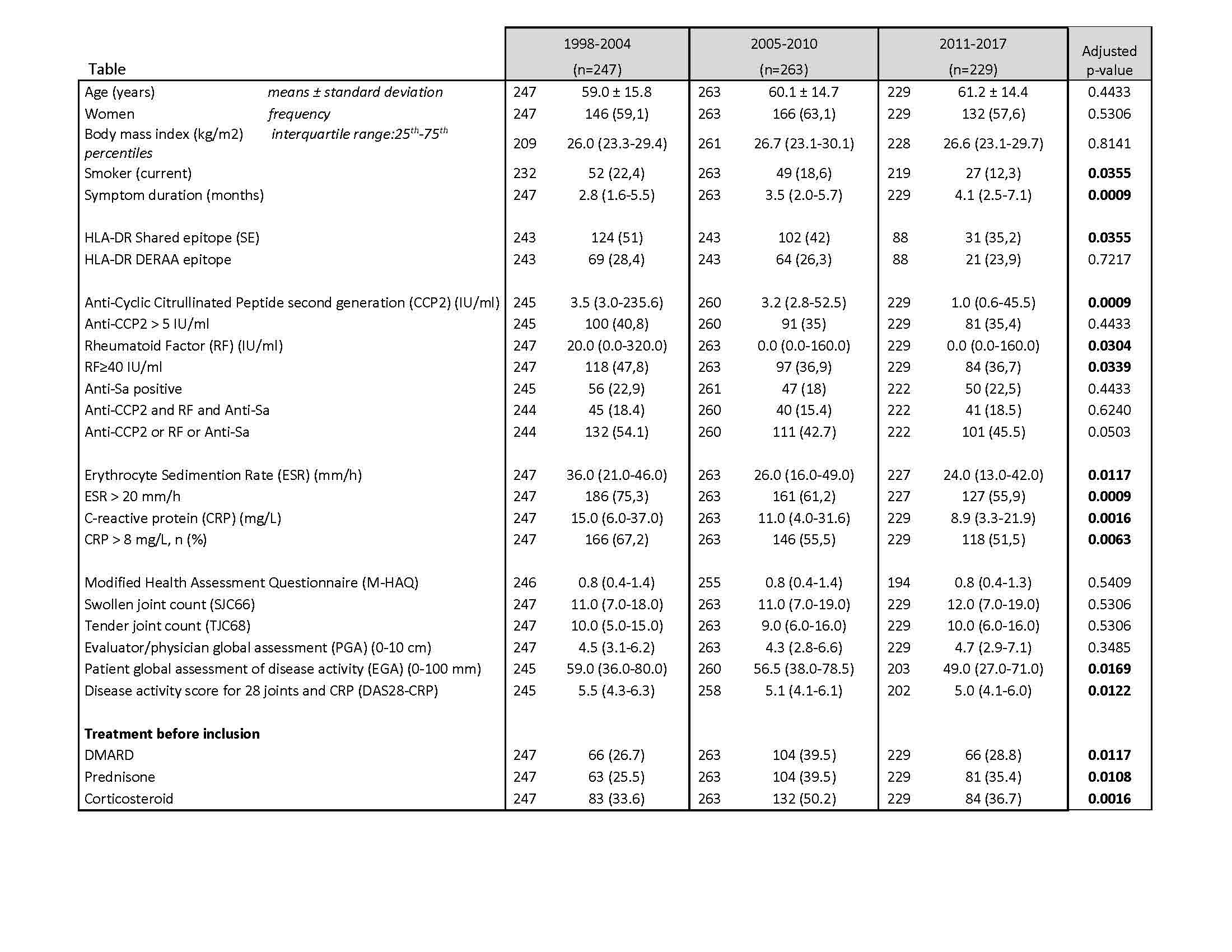Session Information
Date: Wednesday, October 24, 2018
Title: 6W023 ACR Abstract: RA–DX, Manifestations, & Outcomes VI: Outcomes Reports (2982–2987)
Session Type: ACR Concurrent Abstract Session
Session Time: 11:00AM-12:30PM
Background/Purpose: To analyze the evolution of baseline demographic, clinical, serological and genetic characteristics of patients with incident RA over 20 years.
Methods: Since July 1998, the Early Undifferentiated PolyArthritis (EUPA) cohort recruits consecutive adults with recent-onset immune-mediated synovitis affecting at least 3 joints. Baseline characteristics were compared in three subgroups of patients fulfilling RA criteria according to date of inclusion (1998-2004; 2005-2010; 2011-2017). Anti-cyclic citrullinated peptide (CCP2) antibodies and RF were measured using commercial assays, while anti-Sa were measured with an in-house assay or a commercial assay calibrated with it (Arthritis Rheum;2009;60:698-707). Human Leucocyte Antigen (HLA)-DR alleles were determined using sequence-specific primer PCR. False discovery rate correction was used to adjust p-values for multiple comparisons.
Results: 739 patients were included: 247 in 1998-2004; 263 in 2005-2010; 229 in 2011-2017. We observed a decrease in current smokers over time: 22.4, 18.6, 12.3%, respectively (p=0.04). Symptom duration increased (2.8, 3.5, 4.1 months; p<0.001). Markers of inflammation decreased (ESR (mm/h): 36, 26, 24, p=0.01; CRP (mg/L): 15.0, 11, 8.9, p=0.002), as did disease activity (DAS28-CRP: 5.5, 5.1, 5.0, p=0.01), and patient overall assessment of disease activity (PGA) (59.0, 56.5, 49.0 mm, p=0.02); without a parallel decrease in joint counts (SJC: 11, 11, 12 NS) or an increase in corticosteroid or DMARD use before inclusion (33.6, 50.2, 36.7%, p=0.002, 26.7, 39.5, 28.8%, p=0.01, respectively).
RF positivity decreased (47.8, 36.9, 36.7%, p=0.03), but positivity remained stable for anti-Sa (22.9, 18.0, 22.5% NS) and anti-CCP2 (40.8, 35, 35.4% NS), although the mean titers of anti-CCP2 significantly decreased (3.5, 3.2 and 1.0 IU/ml, p<0.001). The proportion of Shared epitope (SE) positive patients decreased significantly (51.0, 42, 35.2%; p=0.04), while the DERAA epitope remained stable.
Relative to anti-CCP negatives, the proportion of SE (62.2 vs 33.8%, RR=2.01, p<0.001) and current smokers (21.8 vs 15.5%, RR=1.28, p=0.04) were higher among anti-CCP2+ patients, and remained stable in anti-CCP2+ patients over time (64.9, 61.8, 54.3%, NS; 25.3, 20.9, 18.8% NS respectively). SE positivity and current smoking decreased in anti-CCP2- patients (41.7, 30.3, 22.6%, p=0.02; 20.6, 17.2, 8.6%, p=0.02).
Conclusion: In this cohort of recent onset RA recruited over 20 years, we observed a constant drift towards less inflammatory RF-negative arthritis at baseline. Decreasing smoking rates paralleled lower levels but not lower incidence of positive CCP. The increasing proportion of SE negative patients in this RA cohort with a relatively stable incidence over 20 years suggest the implication of as yet unidentified environmental arthritis-inducing factors acting on this aging population.
To cite this abstract in AMA style:
Carrier N, Roux S, Masetto A, Fernandes AJD, Liang P, Maoui M, Boire G. The Changing Faces of Rheumatoid Arthritis Patients at Presentation: A 20-Year Study [abstract]. Arthritis Rheumatol. 2018; 70 (suppl 9). https://acrabstracts.org/abstract/the-changing-faces-of-rheumatoid-arthritis-patients-at-presentation-a-20-year-study/. Accessed .« Back to 2018 ACR/ARHP Annual Meeting
ACR Meeting Abstracts - https://acrabstracts.org/abstract/the-changing-faces-of-rheumatoid-arthritis-patients-at-presentation-a-20-year-study/

